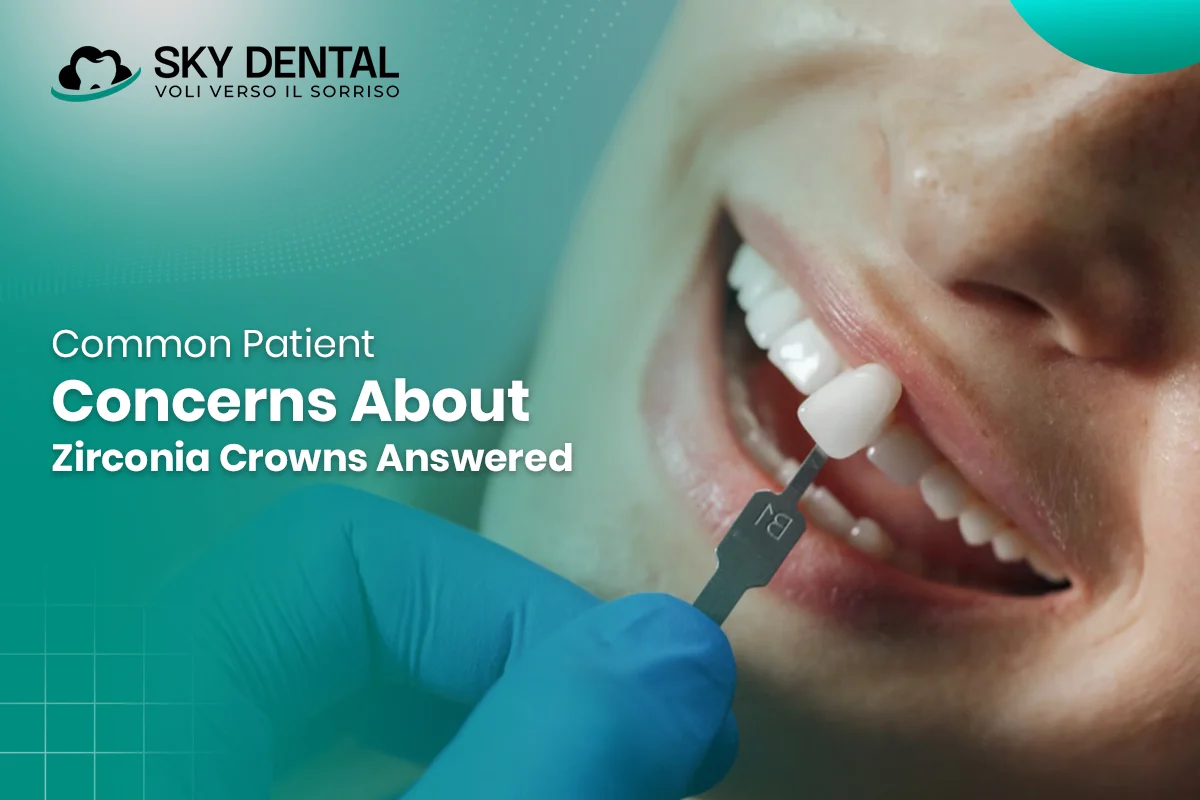
When choosing the material for dental implants and crowns, most people prefer an option that fits their budget, looks natural, blends in perfectly with existing teeth, and doesn’t require frequent replacement.
Porcelain was once the material of choice, but Zirconia has largely replaced it.
If you’re considering a zirconia crown, you probably have many questions. This blog addresses the most frequently asked concerns and provides you with the facts about the pros and cons of zirconia crowns.
What Are Zirconia Crowns?
Zirconia crowns are dental coverings made of zirconium dioxide, used to restore a faulty or decaying tooth. They are stronger than porcelain crowns and generally less expensive than those made of gold or other precious metals.
What Is the Cost of a Zirconia Crown?
A single crown typically costs between €500 and €900–1000. Interestingly, only an expert dentist can assess its quality by lightly tapping on the crown. Poor-quality crowns produce a dull sound.
What’s the Difference Between Zirconium and Zirconia?
- Zirconium: A non-corrosive metal.
- Zirconia (zirconium dioxide): A powdered white ceramic material made from zirconium.
Since zirconia closely resembles the color of natural teeth, it is commonly used in dentistry to fabricate crowns and durable implants.
The terms are sometimes used interchangeably, but “zirconia” is the more accurate one in dentistry.
Are Zirconia Crowns Toxic?
No. Zirconia crowns are perfectly safe! They are non-toxic, biocompatible, and gentle on the gums. They don’t irritate surrounding tissues and are widely trusted in modern dentistry.
What to Expect During the Attachment of a Zirconia Crown
- Your dentist fabricates the crown using CAD/CAM technology, milling it from a block of zirconia. It may be polished or layered with porcelain for a more natural look.
- Your natural tooth is reshaped (sanded down) to make room for the crown. Any decayed or damaged parts are removed, and the tooth is disinfected.
- A temporary crown may be placed while the zirconia crown is being prepared.
- Once ready, the zirconia crown is cleaned, disinfected, and fitted.
- After ensuring a perfect fit, your dentist secures it with dental cement and makes minor adjustments.
How Long Do Zirconia Crowns Last?
On average, they last 10 to 15 years—sometimes longer with proper care. They generally outlast porcelain crowns, making them an excellent long-term investment.
Do They Cause Sensitivity or Allergies?
Most patients do not experience sensitivity. If any issues occur, they are usually temporary and related to the adhesive, not the crown itself.
Zirconia crowns are also a safer choice for people with metal allergies, as they do not release ions that can trigger reactions.
Can Children Use Zirconia Crowns?
They are not usually recommended for children or teenagers, since their teeth and jaws are still developing. Dentists often prefer stainless steel or other temporary solutions until growth is complete. Later, zirconia crowns or implants can be considered.
What Are the Possible Side Effects?
- Temporary tooth sensitivity
- Loosening of the crown if the cement wears off
- Rare cases of crown fracture
- Gum irritation if the crown does not fit properly
Can They Be Used for Back Teeth?
Yes. Zirconia is tough enough to withstand vigorous chewing and grinding forces, making it suitable for molars and premolars.
Do They Stain Over Time?
They are highly resistant to stains from coffee, tea, or smoking. However, slight darkening may appear near the gumline after many years.
Can They Break or Chip?
It’s rare, but possible. Zirconia is very strong, and fractures usually occur only under extreme pressure, such as chronic teeth grinding or biting tough objects.
Can Zirconia Crowns Be Whitened?
Unfortunately, no. Zirconia crowns cannot be whitened with bleaching products. If they become discolored, replacement is the only option for aesthetic purposes.
Final Thoughts
Dentists and patients now widely prefer zirconia crowns over porcelain due to their durability, natural look, and biocompatibility.
While they have some limitations, zirconia crowns are an excellent long-term solution for restoring teeth.
Our dental clinic in Albania provides premium-quality zirconia crowns and implants at a highly cost-effective rate. Don’t wait—book your consultation with us today!

